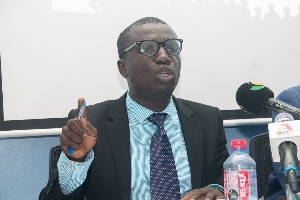 Appiah Kusi Adomako, CUTS Ghana
Appiah Kusi Adomako, CUTS Ghana
A leading research and public policy think-tank, CUTS Ghana, has called on the Ministry of Communications and National Communications Authority to ensure that measures taken to enforce provisions of the Electronic Communications (EC) Act 2008 and National Telecommunications Policy in addressing market and revenue share disparities within the telecom sector be based on evidence and best practice, as they could potentially become counterproductive and discourage future investment in the sector.
“While some Ghanaians, including myself, have become concerned about Scancom MTN’s growing size in terms of market power and dominance, we must understand that a free and liberalised market rewards firms which innovate and invest. MTN has come all the way since the 90s when it entered the market as Spacefon, and has now grown to become the largest share telecom company in terms of market size and industry revenue,” said Appiah Kusi Adomako, Country Director of CUTS Ghana.
Speaking in Accra, Mr. Adomako said: “The duty of government in every free market economy is to provide the needed enabling environment for businesses to take advantage of. Before year 2000, there were three players in the industry: ranked as Ghana Telecom, Millicom (Mobitel) and Scancom (MTN) in size. The market dynamics have changed since then, with MTN now becoming the largest firm in terms of size and profit.
The question we should ask is: how did we get here? What has been these market players’ level of investment? Available data suggest that MTN, faced with ex-ante risk in Ghana, invested and expanded services across the country while other market players slowed their rate of expansion – including the government of Ghana, which is a minority shareholder in Vodafone Ghana”.
This is why one of the reasons intellectual property rights allow firms which innovate to be given patents, trademarks or copyrights of their work is to stimulate innovation.
Talking about whether it is illegal for a firm to be a dominant or monopoly, Mr. Adomako intimated: “Competition (antitrust) regimes all over the world see nothing wrong in being a dominant or a monopoly. What is against the law is abuse of a dominant position in the market.
In any case, with no competition law in place, is there enough competence in Ghana to investigate abuse of dominance? The biggest question is whether MTN gained dominance through disadvantaging rivals or simply because rivals were inefficient. If competitors were inefficient, then the new measures are simply intended to bail out or reward inefficiencies.
“There are some services wherein it is more efficient to be served by a monopoly than to have multiple firms competing due to the inherent sunk cost and natural monopoly conditions. Take for instance, while there are plenty power producers for the grid, the electricity retail market is monopolised by the Electricity Company of Ghana (ECG) for the whole country – with exception of the Northern and part of Brong Ahafo Region which are served by the Northern Electricity Company (NEDCO).”
Section 25 of Electronic Communications Act 775 of 2009
Section 25 of the Electronic Communications Act of 2009 says: The NCA may establish price regulation regimes – which may include the setting, review and approval of prices by Regulation, where there is a sole network operator or service provider or a network operator or service provider with significant market power. As per the Act 775, MTN has reached the 40% threshold; and for that reason, there must be some form of regulation to “ensure fair competition among licencees, operators of communications networks, and service providers of public communication”.
Mr. Adomako urged the regulator to take a full look at the whole industry and not just one player. Currently, under the telecom tower market, there is a merger application between the industry’s two major players; namely American Tower Corporation and Eaton Towers Ghana Limited. Should this merger application be approved, the post-merger share of the merged firms would approach almost 80% of the market share.
Competition law enforcements and regulators hardly ever approve such a merger. Even in cases where they are approved, they come with measures to enhance competition; like selling some of their assets and infrastructure to other competitors to help ensure the merger does not cause any harm to businesses and consumers.
“Clearly, allowing the American and Eaton merger to go through would impact heavily on downstream players in the industry and increase unmerited rent.”
Mr. Adomako hoped that the measures given by the ministry to ameliorate and correct the market to an optimal level should not be issued as orders, but rather be treated as an opportunity to reform the market landscape through good faith, understanding and mutual trust – a win-win for market players and consumers.
Clearly, the existing NCA Act is hamstrung in addressing these issues unfolding in the telecom sector. There is therefore a need to ensure that the draft Competition and Fair-Trade Practices bill of 2019 gets to Parliament for consideration and passage.
CUTS International is an independent non-profit economic policy research, advocacy and capacity building think-tank with regional centres in Accra, Lusaka, and Nairobi, Geneva, Delhi, Jaipur and Washington, DC. CUTS functional areas are in trade and development, regional integration, competition policy, economic and investment regulation as well as consumer education.